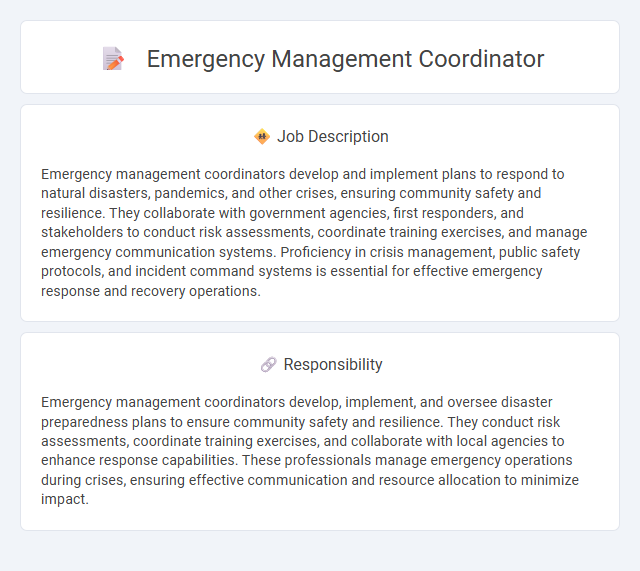
Emergency management coordinators develop and implement plans to respond to natural disasters, pandemics, and other crises, ensuring community safety and resilience. They collaborate with government agencies, first responders, and stakeholders to conduct risk assessments, coordinate training exercises, and manage emergency communication systems. Proficiency in crisis management, public safety protocols, and incident command systems is essential for effective emergency response and recovery operations.
Individuals with strong problem-solving skills and the ability to remain calm under pressure are likely suitable for an Emergency Management Coordinator role. Those who can handle high-stress situations and make quick decisions may find this job aligns well with their capabilities. People who struggle with stress or prefer routine tasks might be less suited to this dynamic and demanding position.
Qualification
An Emergency Management Coordinator must possess a bachelor's degree in emergency management, public administration, or a related field, with many roles preferring a master's degree for advanced expertise. Certification such as Certified Emergency Manager (CEM) enhances credibility and demonstrates proficiency in disaster preparedness, response, and recovery strategies. Strong leadership, communication skills, and experience in crisis management are essential qualifications for effectively coordinating emergency plans and liaising with government agencies and first responders.
Responsibility
Emergency management coordinators develop, implement, and oversee disaster preparedness plans to ensure community safety and resilience. They conduct risk assessments, coordinate training exercises, and collaborate with local agencies to enhance response capabilities. These professionals manage emergency operations during crises, ensuring effective communication and resource allocation to minimize impact.
Benefit
Emergency management coordinator positions likely offer significant benefits such as competitive salaries, comprehensive healthcare plans, and retirement options. There is a strong probability that employees receive extensive training and professional development opportunities to enhance their crisis response skills. The role often includes job stability and the fulfillment of contributing to community safety and resilience.
Challenge
The role of an Emergency Management Coordinator likely involves navigating unpredictable crisis situations that require swift, strategic decision-making under pressure. Coordinators probably face the challenge of coordinating multiple agencies and resources efficiently to minimize risk and ensure public safety. Balancing preparedness planning with real-time emergency response may present ongoing complexities requiring adaptability and strong communication skills.
Career Advancement
Emergency management coordinators develop critical skills in disaster response, risk assessment, and crisis communication that enhance career advancement opportunities. Mastery of federal and state emergency protocols and experience in coordinating multi-agency efforts position professionals for leadership roles in government or private sectors. Advanced certifications such as Certified Emergency Manager (CEM) significantly boost prospects for promotion to senior management or specialized consultancy roles.
 kuljobs.com
kuljobs.com